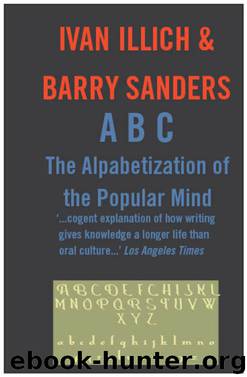ABC by Ivan Illich

Author:Ivan Illich [Ivan Illich]
Language: eng
Format: epub
ISBN: 9780714521503
Publisher: Marion Boyars
Published: 2012-03-14T16:00:00+00:00
Chaucer, in The Canterbury Tales (1386), is the first English author who recognizes the emerging literate mindset of his courtly audience. Defoe, in the Journal of the Plague Year (1772), takes into account that the mind of his middle-class readership has been shaped by journals and magazines, and writes the first English “novel.” And Twain publishes the first great work of fiction from Democratic America, The Adventures of Huckleberry Finn, in 1885, just two years after the New England Journal of Education had coined that curious Americanism, “literacy.”
Modern readers take for granted that The Canterbury Tales is a standard book; after all, it is neatly printed and housed between solid boards. Moreover, its pages are filled with stories—eccentric characters involved in dramatic action. And that is, of course, exactly proper activity for books that are intended to be held in our hands and read to ourselves. But medievalists have been compiling convincing textual evidence since the mid thirties to prove that, while Chaucer’s poem was written down by a number of scribes, it was in all likelihood delivered orally.
Which means that Chaucer’s audience was prepared to listen to a long poem, presumably something they had done many times before. The majority of them, in fact, could probably not have read the poem, even if they so desired. Strangely enough, however, the opening lines of The Canterbury Tales demand a sophisticated literacy. Chaucer begins his poem with one of the most difficult syntactic forms for the listener to grasp, the subordinate clause, which requires the listener to hold the sense of the dependent clause steadily in mind, suspending the fulfillment of meaning that the independent clause promises to deliver. Chaucer compounds this highly literate construction—one that never appears in oral formulaic poetry—by beginning “The General Prologue” to The Canterbury Tales with not one but two consecutive subordinate clauses: the first from lines one to four, the second from lines five through eleven. He holds back the independent clause, “Thanne longen folk to goon on pilgrimages”—and hence leaves dangling the meaning of the early part of the poem—until line twelve.
By line twelve, however, Chaucer’s audience would probably have forgotten what came before, or at best retained only a vague sense of it. His audience could only have felt uncomfortable, perhaps even irritated. To use a medieval designation, he has made them feel like ignoramuses. It is one thing to recite a poem using oral devices—formulaic constructions, repetitions—so that the audience can keep abreast and understand, but quite another to present the same information through highly literate techniques—in Chaucer’s case, by using two sets of subordinate clauses and so forcing his audience to forget. By causing his audience to forget, however, Chaucer introduces one of the major concerns of the poem: the imposition of literacy upon an inherently oral activity—the composition and delivery of poetry.
If forgetting enables Chaucer to turn his audience into auditor/readers—in a sense, they must envision the page as they hear it aloud—it enables him to turn from storyteller into writer.
Download
This site does not store any files on its server. We only index and link to content provided by other sites. Please contact the content providers to delete copyright contents if any and email us, we'll remove relevant links or contents immediately.
Cecilia; Or, Memoirs of an Heiress — Volume 1 by Fanny Burney(32558)
The Great Music City by Andrea Baker(32018)
Cecilia; Or, Memoirs of an Heiress — Volume 2 by Fanny Burney(31956)
Cecilia; Or, Memoirs of an Heiress — Volume 3 by Fanny Burney(31941)
We're Going to Need More Wine by Gabrielle Union(19046)
All the Missing Girls by Megan Miranda(16023)
Pimp by Iceberg Slim(14506)
For the Love of Europe by Rick Steves(14121)
Bombshells: Glamour Girls of a Lifetime by Sullivan Steve(14073)
Talking to Strangers by Malcolm Gladwell(13370)
Norse Mythology by Gaiman Neil(13363)
Fifty Shades Freed by E L James(13239)
Mindhunter: Inside the FBI's Elite Serial Crime Unit by John E. Douglas & Mark Olshaker(9339)
Crazy Rich Asians by Kevin Kwan(9290)
The Lost Art of Listening by Michael P. Nichols(7506)
Enlightenment Now: The Case for Reason, Science, Humanism, and Progress by Steven Pinker(7311)
The Four Agreements by Don Miguel Ruiz(6765)
Bad Blood by John Carreyrou(6621)
Weapons of Math Destruction by Cathy O'Neil(6279)
